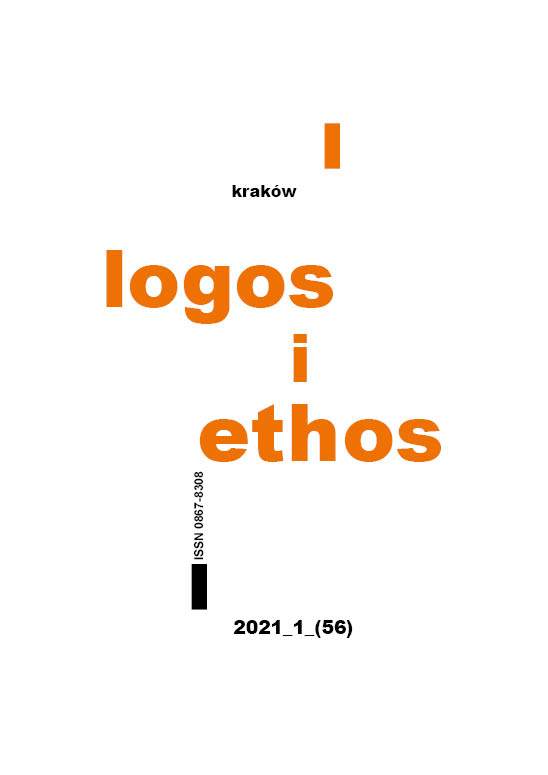Przyjemność i dobro w dialogu Protagoras Platona
DOI:
https://doi.org/10.15633/lie.3936Słowa kluczowe:
h`donh, – przyjemność, avgaqo, n – dobro, evpisth, mh – wiedza, metrhtikh. te, cnh – biegłość mierzenia, swthri, a – ocalenie, zachowanieAbstrakt
Artykuł jest próbą wyjaśnienia, dlaczego w dialogu Protagoras Platon ustami Sokratesa uznaje przyjemność (hedone) za dobro (agathon). Interpretatorzy nie są zgodni co do oceny samej tezy i jej uzasadnienia przez Sokratesa. Wydaje się być ona sprzeczna z poglądami Platona w innych dialogach. Część interpretatorów twierdzi, że jest to prawdziwe spojrzenie samego Sokratesa lub wczesnego Platona z okresu, kiedy pisał dialog. Inni twierdzą, że teza ta jest przesłanką służącą do udowodnienia twierdzenia, iż cnota jest wiedzą. Pojawił się również pogląd, że jedynie pobieżne czytanie tekstu może skłaniać czytelnika do uznania, iż Sokrates poważnie traktuje tezę o związku przyjemności z dobrem. Jeżeli jednak nie traktuje tej tezy poważnie, to dlaczego próbuje przekonać do niej swoich rozmówców? Mając na uwadze te wątpliwości, podjęto analizę tekstu dialogu w celu rozpoznania, czy pojawia się w nim wzmianka o cechach właściwych dobru, które decydują o przyjemności. Ważnym punktem w uzasadnianiu związku przyjemności z dobrem jest wskazanie przez Sokratesa, czym należy się kierować w postępowaniu, aby odczuwać przyjemność w całym życiu i uniknąć złudzeń, dzięki którym pojawia się mniemanie, że przyjemność jest zła. W wyniku przeprowadzonych analiz można postawić wniosek, że decydującą rolę w uzyskaniu stanu gwarantującego przyjemność w całym życiu odgrywa panowanie nad sobą samym.
Bibliografia
Aristoteles Graece, ex rec. I. Bekkeri, vol. 2, Berolini 1831. Wydanie drugie, poprawione: Aristoteles Graece, ed. O. Gigon, Berolini 1960.
Balaban O., Plato and Protagoras. Truth and Relativism in Ancient Greek Philosophy, Lexington Books 1999.
Goodell T. D., Plato’s Hedonism, „The American Journal of Philology” 42 (1921) No. 1, s. 25–39.
Hackforth R., Hedonism in Plato’s Protagoras, „Classical Quarterly” 22 (1928), s. 39–42.
Kahn Ch. H., Platon i dialog sokratyczny, tłum. M. Filipczuk, Warszawa 2018.
Pacewicz A., Hedone. Koncepcja przyjemności w filozofii Platona, Wrocław 2016.
Plato, Philebus, w: Platonis Opera, vol. 2, ed. J. Burnet, Oxford 1910.
Plato, Protagoras, w: Platonis Opera, vol. 3, ed. J. Burnet, Oxford 1909.
Plato, Respublica, w: Platonis Opera, vol. 4, ed. J. Burnet, Oxford 1905.
Plato, Theaetetus, w: Platonis Opera, vol. 1, ed. J. Burnet, Oxford 1905.
Sullivan J. P., The Hedonism in Plato’s „Protagoras”, „Phronesis” 6 (1961) No. 1, s. 10–28.
Zeyl D. J., Socrates and Hedonism: „Protagoras” 351b-358d, „Phronesis” 25 (1980) No. 3, s. 250–269.
Pobrania
Opublikowane
Numer
Dział
Licencja
Autorzy publikujący w czasopiśmie udzielają jego wydawcy zgody o następującej treści:
- Autor zachowuje autorskie prawa majątkowe do utworu, a jednocześnie udziela wydawcy czasopisma zgody na jego pierwszą publikację w wersji drukowanej i wersji online na licencji Creative Commons Uznanie autorstwa 4.0 Międzynarodowe oraz zgody na wykonywanie opracowań, w tym przekładów.
- Autor ma możliwość udzielania zgody niewyłącznej na opublikowanie utworu w wersji, która ukazała się w czasopiśmie (np. zamieszczenia go w repozytorium instytucjonalnym lub opublikowania w książce), wraz z informacją o jego pierwszej publikacji w czasopiśmie.
- Autor może umieścić swój utwór online (np. w repozytorium instytucjonalnym lub na swojej stronie internetowej) jeszcze przed zgłoszeniem utworu do czasopisma.

